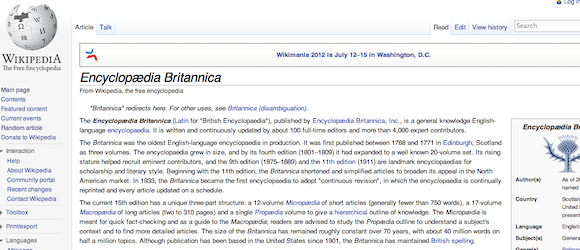The Encyclopaedia Britannica is the Latest Casualty of Death of Print Media
And Now For Something Completely Different

I admit that when I saw the headlines about the Encyclopaedia Britannica going out of print, I thought it was an Onion headline about the Encyclopaedia going out of print hundreds of years from now, with descriptions of just how much shelf space it took up, or hard drive space, or dilithium valence matrix space or somesuch.
But nope. The EB is permanently shuttering its hardcovers due to competition from online research sources, and they’re… actually not at all bitter about it.
Says Jorge Cauz, president of EB Inc., “It’s a rite of passage in this new era. Some people will feel sad about it and nostalgic about it. But we have a better tool now. The Web site is continuously updated, it’s much more expansive and it has multimedia.”
What he’s talking about isn’t Wikipedia, it’s the online version of the Encyclopaedia, which can be had for a subscription fee of $70 a year, a far, far cry from the $1,395 price tag on the 32 volume print edition. The 2010 edition will be the last ever printed, which is to say 12,000 copies were printed, and only 8,000 of them have sold; a minuscule amount for the publishing world. The other 4k are in a warehouse. Sales of the print versions make up less than 1% of EB Inc.’s revenue.
Cauz still believes that the EB has advantages over Wikipedia
We have very different value propositions. Britannica is going to be smaller. We cannot deal with every single cartoon character, we cannot deal with every love life of every celebrity. But we need to have an alternative where facts really matter. Britannica won’t be able to be as large, but it will always be factually correct.
While in its eleven years Wikipedia has risen in esteem from a source that my middle school teachers banned from use, to a source that my friends in med school said was quietly known to be the cheapest, most reliable source for basic information on obscure proteins and other molecules. Crowd sourced information will probably always carry that kind of connotation. According to a 2005 study by Nature (which EB Inc. called “completely without merit”), Wikipedia has an average of four errors per post, while the Encyclopaedia has three. Gary Marchioni, dean of Library Studies at UNC-Chapel Hill, had a slightly different perspective.
There’s more comprehensive material available on the Web. The thing that you get from an encyclopedia is one of the best scholars in the world writing a description of that phenomenon or that object, but you’re still getting just one point of view. Anything worth discussing in life is worth getting more than one point of view.
Well, I guess I’ll go look up Encyclopaedia Britannica on Wikipedia, then.
(via The New York Times.)
Have a tip we should know? tips@themarysue.com